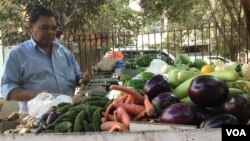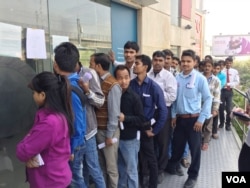India has announced a series of measures to ease a cash crunch for millions of farmers unable to buy seeds, following the government’s unprecedented step to scrap old high-value currency notes. The radical move, aimed at rooting out corruption, has disrupted business and trade in a country that relies heavily on cash transactions.
More than a week into the change, there are no signs of the situation improving as tens of thousands of people continue to line up outside banks and ATMs to obtain the new bills.
Announcing that farmers would be allowed to withdraw up to about $370 a week, Economic Affairs Secretary Shaktikanta Das said, “This will enable the farmers to have cash in their hands and to carry on with their normal agricultural activities in terms of purchasing inputs and other requirements.”
On Thursday, while promising to ease the situation for farmers, the government also slashed the amount of outdated rupee notes that people could exchange to less than half, from about $65 to just under $30.
Prime Minister Narendra Modi’s sudden announcement last week to withdraw high-value currency banknotes in a bid to clamp down on tax evaders could not have come at a worse time for about 250 million farmers, who were in the midst of the winter planting season. With curbs placed on the amount of cash that could be exchanged for new bills, they had no way of buying seeds.
India’s farm sector runs almost completely on cash.
While the move to release more new bills into their hands may help larger farmers buy seeds to sow crops such as wheat, it will do little to ease the problems of small ones, who do not have bank accounts and rely on local money lenders to fund sowing.
Many businesses suffering
It is not just the rural economy that has been thrown into disarray with the withdrawal of 500 and 1,000 rupee notes ($7.50 and $15, respectively), the lifeblood of India’s economy.
Thousands of businesses across towns and cities face a slowdown in a country where cash is the mainstay of daily transactions – to buy fruits, vegetables, shop at stores, or pay the auto rickshaw in which commuters take a ride.
The number of customer visits to markets has fallen and neighborhood grocery stores say there are virtually no customers as people scramble to change old currency or hang on to new bills amid mounting worries about when the situation will normalize.
A dejected Mukesh Kumar, owner of a small mom-and-pop store in Gurgaon, near New Delhi, says business is down "by at least 60 percent. People have not even paid up their monthly bill for milk I supplied."
The initial groundswell of support for Modi’s move to stamp out corruption is in danger of eroding as there is no letup in snaking lines outside banks and ATM’s to change currency or withdraw new bills.
Frustration is mounting and patience is running thin amid growing complaints of poor implementation in replacing the old currency. Many of the ATMs still have to be recalibrated to take in the new notes.
A vegetable vendor in New Delhi, Shiv Shankar, faces massive problems procuring supplies from wholesale markets. "Won’t I be angry if I can’t use my money? They should have let things run the way they were running," he exclaims.
PM asks for patience
Consumers have until December 30 to trade in the now-outdated 500 and 1,000 rupee notes.
Modi, in an emotional address earlier this week, asked people to give him until then to fix the situation and clean up corruption: "I have only asked the nation for 50 days. ... After that, I am ready to face any punishment if I have made a mistake."
Many worry that the cash crunch will not improve anytime soon in a country that needs to replace some 22 billion notes, or 85 percent of all its cash.








